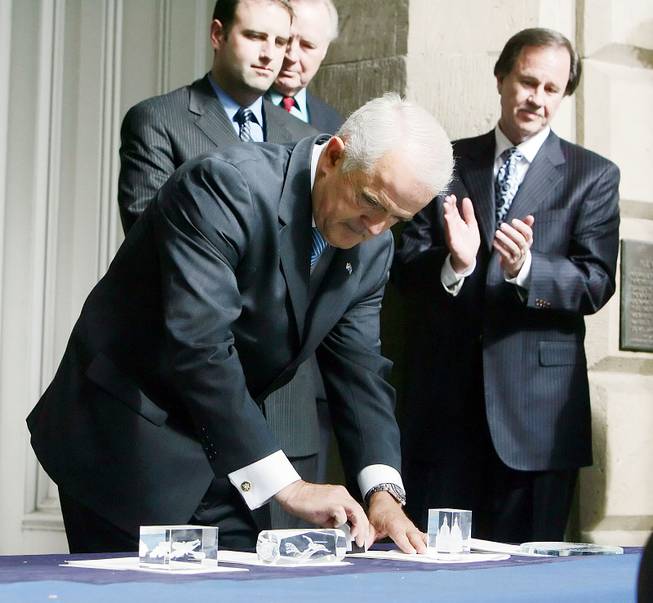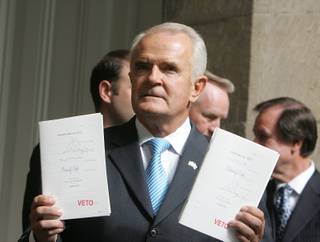
Brad Horn / Nevada Appeal
Gov. Jim Gibbons vetoes legislative bills related to the state budget Thursday on the Capitol steps in Carson City.
Friday, May 29, 2009 | 2 a.m.
Reader poll
Sun Archives
- Gibbons’ veto stings educators at rally (5-28-2009)
- Governor vetoes tax bills, lawmakers look to override (5-28-2009)
- Gov. Jim Gibbons’ statement on tax bill vetoes (5-28-2009)
- Gibbons' veto of rights for gay couples appears safe (5-28-2009)
- Tax bill veto will bring Gibbons to 12 for session (5-27-2009)
- Gibbons signs 43 bills into law, vetoes two (5-26-2009)
- Gibbons vetoes hospital bill, signs others (5-23-2009)
Sun Coverage
Beyond the Sun
Nevadans should not have been surprised Thursday when Gov. Jim Gibbons vetoed legislators’ spending bills and the $780 million tax increase to pay for them.
He pounded down the veto stamp on eight bills in a made-for-TV event that was like an unofficial 2010 reelection kickoff.
This is the governor Nevadans elected.
Despite the Legislature’s cuts in state worker pay and benefits, social and health programs, and schools and universities, Gibbons denounced the budget: “We all deserve the freedom to choose life, liberty and the pursuit of happiness,” he said, “rather than the tyranny of oppressive government and oppressive taxes barging farther into our lives.”
Gibbons has governed exactly as he pledged he would: During his campaign in 2006, he promised no tax hikes and little else. He showed only mild interest in the machinery of government and the services it provides.
He continued Thursday to be the Jim Gibbons Nevadans have come to know, his performance just like the ones that have come before — the enigmatic eyes, the reflexive anti-tax ideology, the occasional stretching of the truth, the awkward stagecraft.
But as always, it was hard to look away.
He came out under his now-signature banner: “Governor Jim Gibbons’ Vision: The people of Nevada deserve a Government that works for them, not against them.” Nearby, two easels displayed grainy, oversized mug shots of Senate Majority Leader Steven Horsford and Assemblywoman Sheila Leslie, both Democrats, next to statements they made in the past opposing taxes.
His image consultants, the ones who guided him through one crisis after another during the final weeks of the 2006 campaign, are all gone now — a mutual parting.
Gibbons’ staff has never employed a fact-checker for his speeches.
In a rhetorical plea with legislators, he asked, “With food prices up, gas prices up, energy prices up, virtually all the basic necessities of life costing more, will your vote help the people you represent?”
Except that American consumer prices declined 0.4 percent during the first quarter, according to The Economist, and many analysts fear deflation, not inflation.
Then there was this: “The liberal leadership in the Legislature took the easy way out with these bills,” he said.
Except that the budget and the $780 million tax increase were supported by five Republican senators — a majority of their caucus. For these legislators, who are certainly no liberals, the vote was surely not an easy one, but they voted yes anyway to support — in the words of Republican Minority Leader Bill Raggio — “essential services.”
Moreover, many would argue Republicans used their leverage wisely, gaining key concessions on public employee benefits and the rules governing collective bargaining for local government employees. Gibbons continued: “I encourage legislators to rethink the devastating burden these bills will place on the people of Nevada.”
Except that even with the tax increase, Nevada will have one of the lowest per-capita tax burdens in the country to support one of the smallest governments in the country, measured by per-capita spending, employees per capita and government as a share of gross domestic product, according to Census Bureau data.
The tax increase, which was coupled with spending cuts to close a nearly $3 billion budget hole, was supported by the mining and tourism industries and the Las Vegas Chamber of Commerce.
In part because of these disconnects, Gibbons has played virtually no role this legislative session.
“It’s been two months probably since I talked to the governor,” said state Sen. Warren Hardy, R-Las Vegas.
Gibbons’ original budget cut state worker and teacher pay 6 percent and slashed 36 percent from higher education. That effectively meant 50 percent cuts in the budgets of the University of Nevada, Reno, and UNLV.
Senate Republicans were as critical of the plan as Democrats.
While the economy continued to crater and revenue numbers fell further, Gibbons offered no real plan to deal with the worsening fiscal news, other than a dead-on-arrival scheme to securitize the state’s tobacco settlement money.
There was also a willful forgetting at the event: The governor included in his budget a 3 percentage point increase in the hotel room tax. He did not sign the measure when it passed in March, though he did not veto it either, and it became law.
About two dozen conservatives — many of whom spent the session arguing against fluoridation of the water supply — cheered Gibbons wildly. For these faithful, the governor has upheld his promise.
After two legislative sessions and with two-thirds of his term complete, indeed he has.
Sun reporter David McGrath Schwartz contributed to this report.


Join the Discussion:
Check this out for a full explanation of our conversion to the LiveFyre commenting system and instructions on how to sign up for an account.
Full comments policy